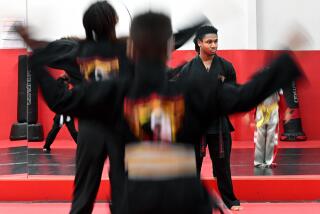Extracurricular Work Spurs Success in College
- Share via
WASHINGTON — High school students who combine good grades with consistently good extracurricular work--from the track team to the debate team--enjoy better odds of success in college than those who excel at their studies alone, a new survey of 3,700 private college students reports.
The study, released Wednesday by the Educational Testing Service and the College Board, concludes that outstanding extracurricular work is a much better indicator of overall college performance than other yardsticks, such as pre-admission interviews and the educational level of a student’s parents.
The study’s definition of “overall” success varied from school to school but included leadership skills and out-of-class accomplishments as well as scholarship. For scholastic success alone, the best high school predictors remain a student’s class rank and Scholastic Achievement Test score, the report stated.
Could Spark Changes
The findings could change both the advice that secondary-school counselors give college-bound students and the standards that colleges employ to select freshmen, said David S. Perham, admissions dean at Colgate University in Hamilton, N.Y.
Counselors “clearly can advise students as early as possible--in the eighth, ninth or tenth grades--to stick with an (extracurricular) activity, to develop a skill,” Perham said. And colleges can discount the poor impression some aspiring freshmen may leave in pre-admission interviews.
“The interview impression did not have a heck of a lot to say about who would end up being successful in college four years later,” Perham said. Nor did such commonly used indicators as a student’s attendance at a private secondary school, holding of an after-school job or an expressed desire to pursue a particular career.
Colgate and eight other private colleges, including Occidental College in Los Angeles, joined in a study of 4,814 students who enrolled as freshmen in the schools in 1979. Of these, 3,676 graduated in 1983. Of 77 factors in the students’ backgrounds studied by the researchers, six proved to be good forecasters of later collegiate success.
Indicators of Potential
The best scholastic predictors were high school class ranking and SAT scores. Other indicators of overall college potential were high school honors such as science fair awards; the “personal statement” students compose when applying to some colleges; the opinions of high school guidance counselors, and what the study’s sponsors called “productive follow-through.”
Productive follow-through “is a pattern of persistent and successful extracurricular accomplishment,” explained Warren W. Willingham, the Educational Testing Service psychologist who conducted the study. “Say a student was on his school newspaper staff for three years and became managing editor, and was on the track team for three years and ended up winning an important meet.”
When combined with the academic predictors such as SAT scores, Willingham said, follow-through is the best indicator of overall college achievement.
Some colleges and universities already take extracurricular performance and the other indicators into account when selecting freshman classes, he said, and a few schools have even devised numerical scales to weigh students’ performance in those areas.
The study may speed the adoption of similar procedures elsewhere, but the most immediate effect of the research may be to discourage schools from using admissions interviews and other discredited factors in their selections.
More to Read
Sign up for Essential California
The most important California stories and recommendations in your inbox every morning.
You may occasionally receive promotional content from the Los Angeles Times.












